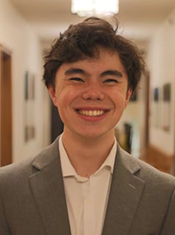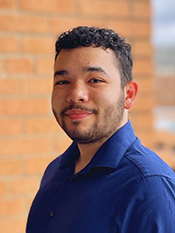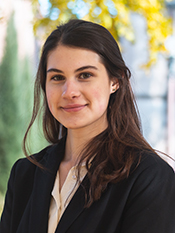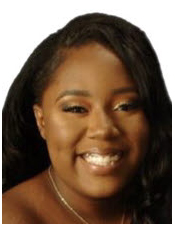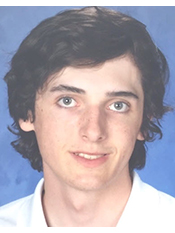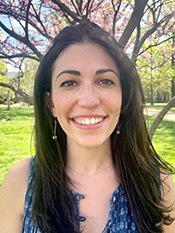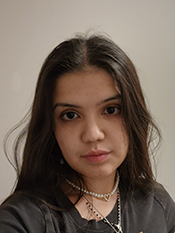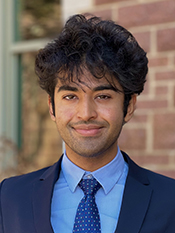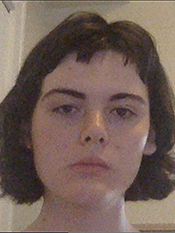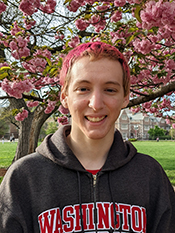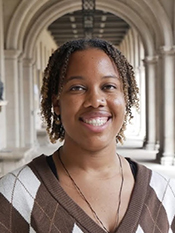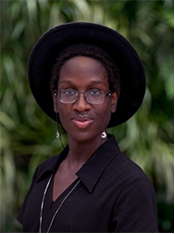Andrew de las Alas, 2025
Major: Global Studies
Minors: Sociology, Asian American Studies
Mentor: Chris Eng
Project title: “Gateway to the East: Filipino Americans in a Black and White City”
Project description: After over 300 years of Spanish occupation, Roman Catholicism has seeped into nearly every dimension of Filipino society and culture. Even after migrating to the United States, the religion still plays an integral role in behaviors and beliefs of Filipino Americans. While a majority of the population is located on the coasts, Filipinos are still very present in the Midwest and have a deep history in St. Louis. To focus in on a relatively understudied population, I intend to conduct interviews to examine Roman Catholic religiosity in the St. Louis Filipino American, its role in creating community, and its contributions to racial identity development.
Mary Rose Bell, Class of 2024
Majors: English and Philosophy-Neuroscience-Psychology
Mentor: Claudia Carroll and Becko Copenhaver
Project title: Phenomenal Mental States and the Reader-Text Relationship in To the Lighthouse
Project description: My project pulls on cognitive literary studies and philosophy of mind to analyze Virginia Woolf’s representations of phenomenal consciousness and perception in To the Lighthouse. The inaccessibility of other minds and the ineffability of phenomenal mental states (e.g., “what it is like” to be conscious) frustrate philosophers and Virginia Woolf alike. Yet, Woolf’s stream-of-consciousness prose and attempts to record the mind’s intricacies repeatedly place readers in the minds of her characters. In her fiction, then, minds are wholly accessible, and the reader is privy to their phenomenal mental states. Since my project attends to the reader’s positionality, I also turn to cognitive literary studies and Theory of Mind to investigate the efficacy of such representations. The reader-text/character relationship enables Woolf to wholly convey her understanding of reality, which, as she notes, is visceral, nebulous, and like phenomenal mental states, also quite outside the realm of language: “For how could one express in words these emotions of the body?”
Jeffrey Camille, Class of 2025
Major: Global Studies and Women, Gender, and Sexuality Studies
Mentor: Rachel Brown
Project title: “On His Monstrous Form: How the State Engenders Men as Agents of Conflict-Related Sexual Violence”
Project description: In enacting war and terrorism, armed combatants frequently and deliberately utilize sexual violence to target civilians. As a uniquely gendered crime, with men composing most perpetrators and women most victims, conflict-related sexual violence (CRSV) — if not resulting in death — inflicts long-term trauma, fractures communities, triggers displacement and fuels illicit activities. My project investigates this phenomenon by exposing the relationship between the state and men in the execution of sexual violence during conflict. Drawing from an array of theoretical and methodological frameworks, I assemble the conditions that states use to engender men as the ideal agents of CRSV— an ideality observed and embodied by men themselves.
Julia Cleary, Class of 2024
Major: Political Science
Minors: Religion and Politics and Legal Studies
Mentor: Amy Gais
Project title: “Racial Bias in Voir Dire: Case Law and Community Reactions”
Project description: In the United States trial system, racial bias is unequivocally present. However, academics often fail to address how voir dire contributes to this. Prior research establishes the presence of racial bias in jury decision-making. But, reforms to decrease jury bias have thus far failed. Through my research, I hypothesize that racial bias in the jury system persists because court decisions addressing bias in voir dire fail to be enforced. My methodology for this project is to conduct a legal analysis of case precedent and court records. I will look at Supreme Court cases that address jury reforms and then analyze subsequent Supreme Court cases to see if the change has been adequately enforced. Next, I examine affected community reactions to the changes to see whether the cases produced theoretical or actual changes. I will conclude by presenting reforms intended to increase equity in voir dire.
Kayla Harrington, Class of 2024
Major: Psychological and Brain Sciences
Minor: Legal Studies
Mentor: Lori Markson
Project title: “Black Girlhood: Adultification Bias in the Education System”
Project description: Adultification, a relatively newly described phenomenon, is a form of racial discrimination in which Black children are treated by adults as being older than they are. This social stereotype is meant to effectively reduce or remove the consideration of innocence and childhood within the Black child. Black girls’ behavior in schools are often understood by educators as being more socially, physically, and sexually mature than their white counterparts. In relation to this perceived maturity, Black students are subjugated to harsher and stricter surveillance and punishments. As the new phenomena of adultification has been studied, there is little investigation for how this may negatively affect the development of Black girls within the education system. For my project, I will analyze and conduct interviews with teachers, principals, and educators to explore the ways in which adultification bias affects the way Black girls engage with, internalize, and interpret their treatment from adults at school.
Joy Hu, Class of 2025
Major: Economics
Minors: American Culture Studies and Finance
Mentors: Gaetano Antinolfi and Dave Walsh
Project title: “The Rush for Digital Gold: Regulatory Reactions to Cryptocurrency and New Financial Frontiers”
Project description: My project analyzes competing public narratives surrounding cryptocurrency’s contentious legal and regulatory position in the United States. I focus on arguments advanced by regulatory entities at the federal and state level as well as counternarratives from companies seeking wider freedom for cryptocurrency operations. My research examines how these conflicting narratives influence the ongoing litigation surrounding cryptocurrency’s legal status as well as the implications for future frameworks of financial regulation. By comparing contemporary regulatory battles to controversies surrounding other digital innovations in the previous three decades, I seek to uncover how the federal government approaches regulating novel technological and financial instruments for which little precedent exists.
Dylan Maya-Tudor, Class of 2024
Majors: International Affairs and Latin American Studies
Mentor: Steven Hirsch
Project title: “Revolutionary Solidarity and Cross-Continental Connectivities: Vietnam and Latin America in the Cold War”
Project description: Vietnam’s solidarity with Latin American revolutionaries during the Cold War has been largely overlooked. My research seeks to redress this oversight by analyzing Vietnam’s relationship with various guerrilla organizations including Colombia’s FARC and El Salvador’s FMLN as well as successful revolutionary movements like Nicaragua’s Sandinistas. It will also examine the close revolutionary cooperation between Vietnam and Cuba. In particular, it will highlight Cuba’s role as a conduit for Vietnamese arms and supplies and as a staging area for PAVN training courses.
Lena Levey, Class of 2025
Major: Religious Studies
Minors: Writing and Spanish
Mentor: Victoria Thomas
Project title: “Noah’s Ark in Contemporary Apocalyptic Literature”
Project description: Many modern authors have used the story of Noah and the Flood to comment on human sin and its consequences. Drawing from ancient Jewish texts, such as the Talmud and the Midrash, I am investigating and analyzing contemporary portrayals of the Flood in literature that depict climate change. Both ancient rabbis and modern authors have grappled with the same moral questions posed by this story: What does it mean for all humans to be equally and irreparably sinful? When is violence against humanity justified? Is unwavering, unquestioning loyalty virtue or cowardice? I would like to explore how these questions endure and change over time, and how they are applied to the modern existential threat of climate change.
Melina Marin, Class of 2025
Majors: English Literature and French
Minor: Biology
Mentor: J. Dillon Brown
Project title: “Navigating the Scare-ibbean: Tracing the Socio-Political Legacy of Monstrous Figures in the Caribbean”
Project description: This project aims to examine monsters (mainly the vampire, zombie, and cyborg/modified human) in Caribbean speculative fiction media as visualizations of cultural anxieties responding to long-standing colonial structures and sociopolitical changes such as socialist revolutions or US/Russian involvement in Cuba. In undertaking this project, I will analyze how authors, filmmakers, and artists employ monsters in their works to process and critique both the stagnant aspects of colonial hierarchies and the rapidly changing movements that paradoxically support and modify these systems. My particular interest lies in how these authors interact with existing monstrous figures pulled from both inside and outside the Caribbean to crystallize a distinct national and Caribbean identity as a response to the diasporic origins of the Caribbean as an intersection of native, colonial, and enslaved populations.
Omaer Naeem, Class of 2024
Major: Global Studies – International Affairs
Minors: Asian American Studies, and South Asian Language and Civilization – Urdu
Project mentor: Shefali Chandra
Project title: “Vignettes of Resistance in Militant Pakistan: Analyzing ‘Hum Dekhenge’”
Project description: This project explores, contextualizes and critically analyzes Iqbal Bano’s rendition of Faiz Ahmed Faiz’s “Hum Dekhenge” as an act of resistance against General Zia ul-Haq’s military regime in Pakistan from 1977 to 1988. This analysis will construct an emotional history and landscape behind the Zia regime and the performance itself, suggest the limitations behind this act of resistance, and reimagine the consequences of this protest.
Cecilia O’Gorman, Class of 2025
Majors: English Literature, and Comparative Literature
Mentors: Jami Ake and Tili Boon Cuillé
Project title: Balzac’s Sarrasine and the Problem of Trans Hermeneutics
Project description: Most major interpretations of Sarrasine have hinged on one fundamental premise: that La Zambinella, a castrato who lives and dresses as a woman, is not “really” a woman. Her status as impostor has been taken for granted; to Roland Barthes, for example, her female presentation can only be understood as an effort to deceive the story’s male protagonist. Far from merely “passing,” La Zambinella is described as more beautiful than beautiful, more real than real. My project will pose a series of questions about Sarrasine and how it has been read over the years: What does it mean when the “ultimate woman” is not a “woman” at all? What happens when we can’t tell the difference, or even prefer the right one? More broadly, I plan to use Sarrasine as a case study on the question, or possibility, of trans hermeneutics. What should a “trans reading” of a nineteenth-century novella look like? What, if anything, can a distinctly “trans” (as opposed to merely “queer”) reading method reveal?
Nash Overfield, Class of 2024
Major: African and African American Studies
Minor: Women, Gender and Sexuality Studies
Mentor: Timothy Parsons
Project title: “Pan-Africanism and Organized Labor”
Project description: My project will examine the historical connections between Pan-Africanism and organized labor. My project will cover the period from the First Pan-African Congress in 1919 to the mid ’60s as African nations gained independence, with most of my research focusing on the latter years. I will specifically be researching the individuals who were major Pan-African and labor leaders and see how their involvement in both influenced them and how the influences of the two movements affected each other.
Aja Topps-Harjo, Class of 2025
Majors: Psychological and Brain Sciences, and African and African American Studies
Project mentor: Seanna Leath
Project title: “Dismantling the Master's House with the Master’s Tools: An Examination of Black Women Scholars’ Pursuit of Equity within the Legal System”
Project description: My research project — framed by Audre Lorde’s question, “Can the master’s house be dismantled with the master’s tools?” — addresses a critical and complex issue at the intersection of law, race and gender. By focusing on the experiences and strategies of Black women scholars and legal professionals my project offers an essential exploration of how the legal system, despite its historical ties to racial exclusion and elitism, can potentially be harnessed as a tool for promoting equity within the United States. My project aims to uncover the challenges, successes and perceptions of Black women within the legal profession, shedding light on their pursuit of legislative avenues to effect societal change.
Violet Walker, Class of 2024
Majors: English Literature and Women, Gender and Sexuality Studies
Mentors: Amy Cislo and Beth Windle
Project title: “Taking the Form: Magical Sex Changes, Transgender Identity, and Gender Embodiment”
Project description: Virginia Woolf’s Orlando, published in 1928, is a biography about the fictional life of Orlando, an English noble who, suddenly and quite inexplicably, changes from male to female after a long rest. While the novel, through this transformation, explores gender in ways useful and relevant to transgender individuals, the supernatural element of Orlando’s instant and complete sex change does not reflect the long and frustrating transitions trans* individuals may undergo. Paul Takes the Form of a Mortal Girl by Andrea Lawlor, which reimagines Orlando as Paul, a queer college student who freely shapeshifts between sexes, is similarly at odds with actual transgender experience even as it explores gender, sex, and sexuality in 1990s lesbian, gay, and queer subcultures. This project seeks to explore the tensions between magical and real-life gender transitions and explore what magical transitions say about gender embodiment, bodily plasticity, and gendered meanings of the body.

